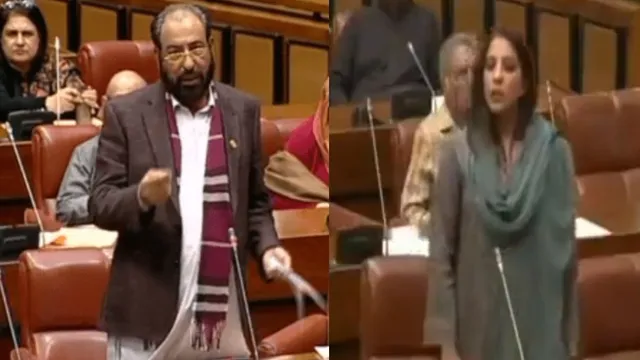- By Ajeet Kumar
- Wed, 30 Apr 2025 01:36 PM (IST)
- Source:JND
Amid soaring tensions between India and Pakistan following a deadly terror attack in Pahalgam, Pakistani lawmakers are continuously engaged in war-mongering. In a series of provocative statements by Pakistani lawmakers, Pakistan Peoples Party Parliamentarians (PPPP) leader, Palwasha Mohammad Zai Khan has added a new height to the contentious commentaries passed by the Pakistani legislators.
Delivering a speech in the Pakistan Senate over the tensions between two nuclear-armed countries, Khan made bold claims saying the first brick at the new "Babri Masjid" in Ayodhya will be placed by a Pakistani army soldier. She didn't even stop here. Khan went on to say that the Pakistani Army Chief General Asim Munir would recite first Azan. "The first brick at the new Babri Mosque in Ayodhya will be put by Pakistani Army soldiers and the first Azaan by Pakistan Army Chief Asim Munir," she said.
"We are not wearing bangles'," added Khan.
❗️Pakistani Senator Palwasha Mohammad Zai Khan on Tuesday.
— Satyaagrah (@satyaagrahindia) April 30, 2025
'The First brick at the new Babri Mosque in Ayodhya will be put by Pak Army soldiers, & first azan by Pakistan Army chief Munir'
'We are not wearing bangles'
Lauds India listed Khalistani terrorist Pannun.
Join |… pic.twitter.com/iUn0mPyzf6
The Pakistani lawmaker even praised Khalistani terrorist Gurpatwant Singh Pannun for his anti-India stance. According to Khan, Pannun urged the people of Punjab, especially Sikhs not to engage in war with Pakistan. Calling Pakistan a land of "Gurunank Dev", Khan said this is a sacred place for Sikhs, and hence Sikhs should not start a war.
Facts on Babri Masjid
In a verdict delivered on November 9, 2019, the Supreme Court had ordered the construction of a Ram Temple at the site, where the 16-century-old Babri Masjid stood before it was demolished. The court, while giving away the land to construct the temple also allotted five acres land elsewhere in Ayodhya for Muslims to construct a mosque. On the orders of the government, the Sunni Central Waqf Board was allotted the land in Dhannipur village in Raunahi of Ayodhya district.
The Indo-Islamic Cultural Foundation Trust formed for the construction of the mosque has also announced to build a hospital, community kitchen, library and research institute along with the mosque on the given land. It was expected that the construction of the mosque would be completed along with that of the Ram Temple. The consecration ceremony of the Ram temple was done in January, but the construction of the mosque is yet to start.
Pakistani Senator's Ambitious Claims
ANP Senator Haji Hidayatullah Khan also made tall claims saying India should remember that Pakistan ruled India for 1000 years-- a claim which has no historical facts.
Pakistani legislator in Pakistani Parliament: They should remember we ruled Hindustan (India) for 1000 years#Pakistan #PahalgamTerroristAttack pic.twitter.com/hLUopaPba3
— Ajeet Kumar (@Ajeet1994) April 30, 2025
Fact check: Did Pakistan govern India for a 1000-year?
It is worth noting the idea originates from a misinterpretation of history. Various Muslim dynasties, such as the Delhi Sultanate and the Mughal Empire, ruled parts of India for several centuries, roughly from the 13th to the 19th century. These were not "Pakistani", as Pakistan as a nation-state did not exist until 1947. The rulers were of Turkic, Afghan, and Mughal origin, governing diverse regions that included modern-day India, Pakistan, and Bangladesh. The duration and extent of their rule varied, but it was not a continuous 1,000-year period, nor was it "Pakistan" ruling India.

